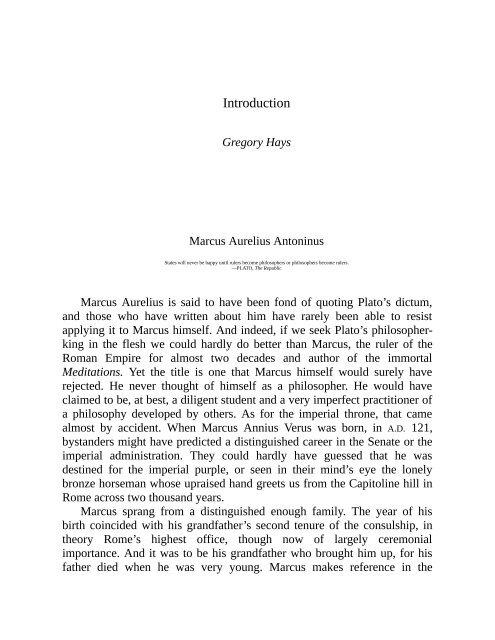9781945186240
You also want an ePaper? Increase the reach of your titles
YUMPU automatically turns print PDFs into web optimized ePapers that Google loves.
Introduction<br />
Gregory Hays<br />
Marcus Aurelius Antoninus<br />
States will never be happy until rulers become philosophers or philosophers become rulers.<br />
—PLATO, The Republic<br />
Marcus Aurelius is said to have been fond of quoting Plato’s dictum,<br />
and those who have written about him have rarely been able to resist<br />
applying it to Marcus himself. And indeed, if we seek Plato’s philosopherking<br />
in the flesh we could hardly do better than Marcus, the ruler of the<br />
Roman Empire for almost two decades and author of the immortal<br />
Meditations. Yet the title is one that Marcus himself would surely have<br />
rejected. He never thought of himself as a philosopher. He would have<br />
claimed to be, at best, a diligent student and a very imperfect practitioner of<br />
a philosophy developed by others. As for the imperial throne, that came<br />
almost by accident. When Marcus Annius Verus was born, in A.D. 121,<br />
bystanders might have predicted a distinguished career in the Senate or the<br />
imperial administration. They could hardly have guessed that he was<br />
destined for the imperial purple, or seen in their mind’s eye the lonely<br />
bronze horseman whose upraised hand greets us from the Capitoline hill in<br />
Rome across two thousand years.<br />
Marcus sprang from a distinguished enough family. The year of his<br />
birth coincided with his grandfather’s second tenure of the consulship, in<br />
theory Rome’s highest office, though now of largely ceremonial<br />
importance. And it was to be his grandfather who brought him up, for his<br />
father died when he was very young. Marcus makes reference in the


